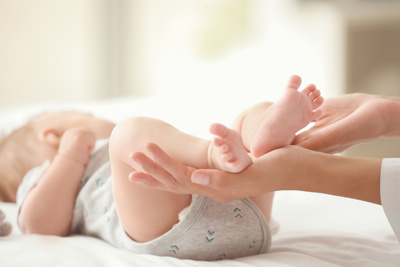- Date awarded: February 2023
- Awarded value: £33,570

A project which could speed up the early detection of hip problems in new-born babies is being trialled in Fife.
NHS Fife staff are working with a team from the University of Alberta in Canada on the initiative.
They will be testing the use of a hand-held scanner, which harnesses the power of artificial intelligence (AI) to support the diagnosis of developmental dysplasia of the hip. This is a condition where the hip (ball and socket) joint fails to develop normally.
One in ten babies are born with hip instability, one in 100 babies are treated for hip dysplasia and one in 500 are born with a dislocated hip.
Early diagnosis and treatment can avoid costly surgery or problems in later life.
Currently in Scotland, only higher-risk infants are sent for special ultrasound scans to detect hip dysplasia. These scanners need to be used by experienced staff and are expensive to deliver.
The Canadian, AI-powered solution, is significantly cheaper and can be used by clinical staff without years of specialist training. Trials using the new equipment are due to start in Fife in the spring of 2024.
Fife Health Charity has given £33,570 to employ a part-time data manager to help support the trial using the new equipment.
If the trial is successful, it could offer an opportunity for “universal” ultrasound scanning for all new-born babies in Fife. This potentially could lead to adoption across the NHS in Scotland and the UK.
Joyce Henderson, a Lead Advanced Practice Physiotherapist in NHS Fife, is leading on the trial. She said the Canadian tool delivers results in less than one minute. Its use, she said, could transform clinical services, reduce backlogs, waiting lists and costs and most importantly support better clinical outcomes for babies.
“We know that hip dysplasia, if it’s found late, has a risk of poorer outcomes and potentially could lead to early onset arthritis and hip-joint replacements.”
She said she was pleased the Fife Health Charity was able to support the trial.
“The tool we’re using has FDA approval in the United States but is not yet validated within the UK. This is a preliminary trial to see if it would work within our NHS system. It has very good results so far in Canada but it hasn’t been trialled in the UK or Europe yet.
“Our trial will look to assess new-born babies before they leave hospital and later at six to eight weeks old. This is all about improving the quality of the examinations we can offer new babies and reduce the requirement to make additional trips into acute hospitals for assessment.
“I’m hugely grateful to Fife Health Charity. Our new data manager, employed with the charity’s funding, is a young mum herself and has been a great support to me in setting up this trial. Without that kind of support, management and co-ordination for the project I would
really struggle to get it done in any kind of timely manner.”


